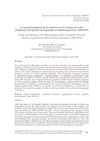Please use this identifier to cite or link to this item:
https://accedacris.ulpgc.es/jspui/handle/10553/14998
| Title: | La escuela primaria de la minería en el Concejo de Aller (Asturias). Del primer franquismo al tardofranquismo: 1940-1975 | Authors: | Díaz González, Mª del Mar | UNESCO Clasification: | 55 Historia | Keywords: | Franquismo | Issue Date: | 2015 | Journal: | Vegueta: Anuario de la Facultad de Geografía e Historia | Abstract: | Tras la derrota de la República española, la estructura educativa fue desmontada en toda España y sustituida por una escuela centrada en los valores religiosos y patrios propugnados por el régimen franquista. El libro de actas de la Junta Municipal de Educación Primaria de Aller es una fuente privilegiada, inédita hasta el momento, para analizar la organización educativa durante el extenso periodo analizado. Este documento atestigua asimismo la dimensión política franquista y tardofranquista y la situación socio-laboral, como evidencian los objetivos de este artículo. Dentro de los programas paternalistas, activos hasta 1970 inclusive, las compañías mineras ya habían creado centros escolares religiosos en Aller durante el primer cuarto del siglo XX. Sin embargo, la mayor parte de los hijos de los mineros recibieron su instrucción en las escuelas nacionales, afianzadas sobre los rígidos esquemas de obediencia y sumisión. La educación franquista se ha esforzado en perpetuar los cometidos sociales de niños y niñas por medio de una educación segregada y represiva.After the defeat of the Spanish Republic, rpublican educational structure in Spain was dismantled around the whole country and replaced by one focused on the religious and patriotic values espoused by the Franco regime. The minute book contains the local board's agreements between 1940 and 1975, not only in terms of educational management, which are exposed along the aims of this article. The source used for this article, unpublished until now, has also facilitated the study of the political and social-labour paternalistic dimension during the long period of time analysed. Within the paternalistic programmes, active until and including 1970, mining companies had already established faith schools in Aller, but most of the miners' children received their education in state schools entrenched in severe patterns of obedience and submission. The educational system within Franco's regime has strived to perpetuate the social roles of girls and boys through single-sex education. | URI: | https://accedacris.ulpgc.es/handle/10553/14998 | ISSN: | 1133-598X | Source: | Vegueta : Anuario de la Facultad de Geografía e Historia. Las Palmas de Gran Canaria : Universidad de Las Palmas de Gran Canaria, Servicio de Publicaciones, 1992- . ISSN 1133-598X, n. 15, 2015 |
| Appears in Collections: | Artículos Vegueta. n.15, 2015 |
Page view(s)
81
checked on Jan 10, 2026
Download(s)
629
checked on Jan 10, 2026
Google ScholarTM
Check
Share
Export metadata
Items in accedaCRIS are protected by copyright, with all rights reserved, unless otherwise indicated.
